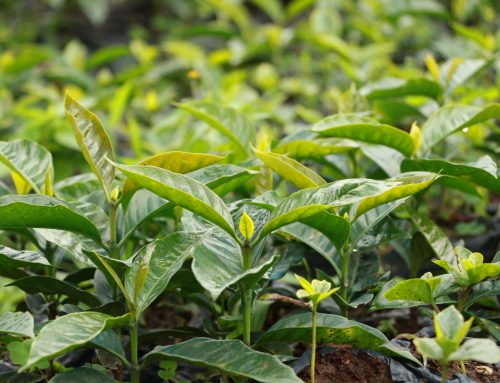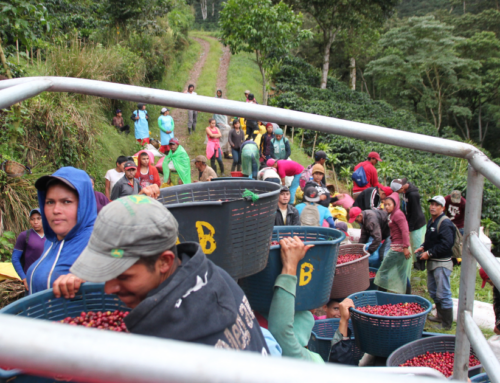Tariffs on Coffee: A Guide for Roasters, Retailers, and Curious Consumers
In early April 2025, U.S. coffee importers received a rude awakening: for the first time in recent memory, we were slapped with tariffs on coffee. Specialty importers, roasters, and customers alike have raised big questions—and we’re here to help clarify what’s happening, who it impacts, and what we’re doing about it.
We will continue to update this blog as the situation evolves and post new, breaking information as it becomes available. Please reach out to us if you have questions or want to discuss your sourcing strategy. We’re in this together.

Truck loaded with coffee to be milled before export
First Things First: What Is a Tariff, and Who Pays It and Where does it go?
A tariff is a tax assessed on imported goods when they enter a country. In the U.S., these are collected by U.S. Customs and Border Protection (CBP). The coffee importer pays the tariff, typically through their customs broker, before the shipment is released from port.
An example of a tariff: If a shipment of green coffee has a declared value of $100,000 and a 10% tariff applies, that’s an additional $10,000 paid up front by the importer.
This cost becomes part of the replacement cost of the coffee. In other words, it’s not a windfall or a markup—it’s a new part of the base cost of doing business. Unfortunately, we cannot absorb that cost. Inevitably this increase will hit roasters and the end consumers.
The additional money from tariffs will not be seen by the farmer either. The tariffs will be paid by American companies (not by foreign countries), and the funds go to the U.S. Department of Treasury.
This isn’t about protecting American coffee farmers. As the National Coffee Association’s (NCA) CEO Bill Murray put it, “This is a tax on U.S. consumers, collected in a different way.”

Weighing coffee cherries at our Mt Elgon washing station
Clarifying Some Common Questions About the Tariffs on Coffee
Who is responsible for paying the new coffee tariffs?
Importers are responsible for paying these tariffs directly to U.S. Customs before shipments are released. The cost is not absorbed by foreign producers or exporters—it is an added expense borne by U.S. importers at the time of entry.
How do tariffs impact coffee pricing?
Tariffs directly affect the cost of landing new coffee. Since our pricing is based on replacement cost, any increases—such as tariffs—must be reflected in our pricing to ensure sustainable sourcing and business continuity.
Can’t the U.S. expand domestic coffee production to offset tariffs?
While small amounts of coffee are grown in regions like Hawaii and Puerto Rico, U.S. production accounts for less than 0.01% of what Americans consume. As NCA CEO Bill Murray points out, “Since coffee beans cannot be grown in most of the United States, trade policies should take into account the essential role of coffee trade in Americans’ daily lives and in the U.S. economy.”
If tariffs are removed, will coffee prices return to previous levels?
Tariffs are paid when coffee enters the country, so past costs are already baked into the price of our inventory. While future pricing would adjust if tariffs are lifted, it is not possible to retroactively refund past tariff-related costs.

Transporting green coffee from the mill to port
How Tariffs on Coffee Will Affect Coffee Roasters
The tariffs on coffee come at a very sensitive time. The price of coffee has been rising sharply due to weather and supply concerns. The factors involved in pricing green coffee has never had to consider tariffs, but this may be the new normal. Coffee Roasters can expect:
- Green coffee will become more expensive because of the tariffs. Coffees with a bill of lading dated April 5 or later are subject to the new tariffs.
- Contracted coffee pre-April 5 remains tariff-free, but future lots will be priced with the additional 10% built in.
- Market volatility may increase, especially as freight and logistics continue to shift.
- Specialty coffee is uniquely vulnerable. Smallholder producers and ethical sourcing models are under more pressure as pricing becomes more about cost than impact.
How Much Are the Tariffs on Coffee?
While coffee from most countries are currently subject to a 10% import tariff, there’s one key exception. Products from Mexico (and Canada) are exempt if they qualify under the USMCA trade agreement (the successor to NAFTA). Many exporters in Mexico do qualify—but not all.
Here’s where it gets tricky: a lot of decaf processing happens in Mexico and Canada, but the green coffee often originates elsewhere—Brazil, Peru, Central America. If those coffees are shipped to Mexico or Canada for decaffeination, they are still subject to tariffs.
Why? Because the tariff is based on the origin of the green coffee, not just where it was processed. That means both the green coffee and the toll processing costs are hit with the 10% tariff if the coffee isn’t USMCA-exempt.
Sadly, we expect Mexican suppliers to raise prices as a result. With Mexico now the only producing country with 0% tariffs, there will likely be higher demand giving Mexican producers and exporters more leverage—and the global market will react accordingly.

Producers delivering bags of coffee cherries to the wet mill in Mt Elgon
What Next?
First there were tariffs on Canada and Mexico, then reciprocal tariffs, then there was a 90-day reprieve. With so many things in flux it’s difficult to know what will happen next week. However, things may get worse before they get better.
The White House recently announced that it would impose fees on Chinese-built vessels (once per voyage) arriving at US ports. “Ships and shipping are vital to American economic security and the free flow of commerce,” said U.S. Trade Representative Jamieson Greer. “The Trump administration’s actions will begin to reverse Chinese dominance, address threats to the U.S. supply chain, and send a demand signal for U.S.-built ships.”
This initiative could increase the cost of Ocean Freight rates, which would increase the logistics cost of importing green coffee into the US. We will keep you posted as we learn more.
What Can You Do?
- Talk to your representatives. As small business owners, you have a unique and impactful voice. We’ve created a sample letter you can edit and send to your elected officials (see below).
- Educate your team and customers. This blog post is a good start—feel free to share or link to it.
- Connect with other roasters. Collaboration and communication matter right now more than ever.
- Call us. Let’s talk about your buying plans. We are here to help you work through timing, business planning, and more.
________________________________________
Why This Matters
The U.S. is the world’s largest coffee importer. These tariffs don’t just hit corporations—they hit every corner of the coffee supply chain, from smallholder producers to family-run roasteries. They also can affect what kind of coffee is available in the U.S.—and at what price.
And perhaps there’s hope. An application by the United States’ National Coffee Association (NCA) to get coffee exempted from tariffs imposed by U.S. President Donald Trump has been well received, the NCA’s CEO Bill Murray said during an industry event in Brazil’s Sao Paulo state on last week. “We think it is a good sign that our request has been well received and is being looked at, but it’s impossible to predict if that means anything,” Murray said via video call at an event held by Brazilian coffee roasters association.
Stay informed. Stay engaged. We’ll keep doing the work to bring you the best coffees in the world.
________________________________________
[Your Name]
[Your Address]
[City, State, ZIP Code]
[Your Email]
[Your Phone Number]
[Date]
The Honorable [Congressperson’s Name]
[Office Address]
[City, State, ZIP Code]
Subject: Remove the Tariffs on Coffee – A Global Industry at Risk
Dear Representative [Last Name],
I’m reaching out to ask for your support in removing the recently imposed tariffs on coffee and related imports. These tariffs, announced in April 2025, are putting strain on every link of the coffee supply chain—from farmers and processors abroad to small businesses and coffee consumers here in the U.S.
Coffee growers in the U.S. are incapable of growing the volume of coffee needed to meet the demand in the U.S., yet the entire coffee industry is now burdened with added costs that serve no protective purpose. These tariffs function as a tax on American businesses and consumers, not on foreign exporters.
As a [coffee roaster/business owner/coffee professional/consumer], I’ve seen firsthand how these tariffs are impacting our ability to source, price, and provide quality coffee:
- Tariffs raise the cost of imported green coffee by as much as 10%, with some countries seeing even steeper increases.
- These costs trickle down: affecting cafes, grocery pricing, wholesale operations, and ultimately, the coffee drinker.
- Smallholder farmers abroad—already vulnerable to climate and market volatility—are hurt when U.S. demand drops due to artificially inflated prices.
- U.S. businesses are forced to make difficult decisions about sourcing, staffing, and sustainability investments.
Meanwhile, the threat posed by coffee imports are insignificant to U.S. domestic agriculture.
We respectfully urge you to:
- Advocate for the exemption of coffee from these tariffs, as has been the historical precedent.
- Support fair and informed trade policy that strengthens, rather than disrupts, industries built on global cooperation.
- Engage with the National Coffee Association and other trade stakeholders to understand the real-world impact of these tariffs on American jobs and small businesses.
Coffee is more than a daily habit—it’s a livelihood, a global connector, and a critical U.S. import. We need smart, sustainable policies that reflect that.
Thank you for your time and attention to this urgent issue.
Sincerely,
[Your Name]
[Your Business/Organization (if applicable)]
[Your Contact Information]






